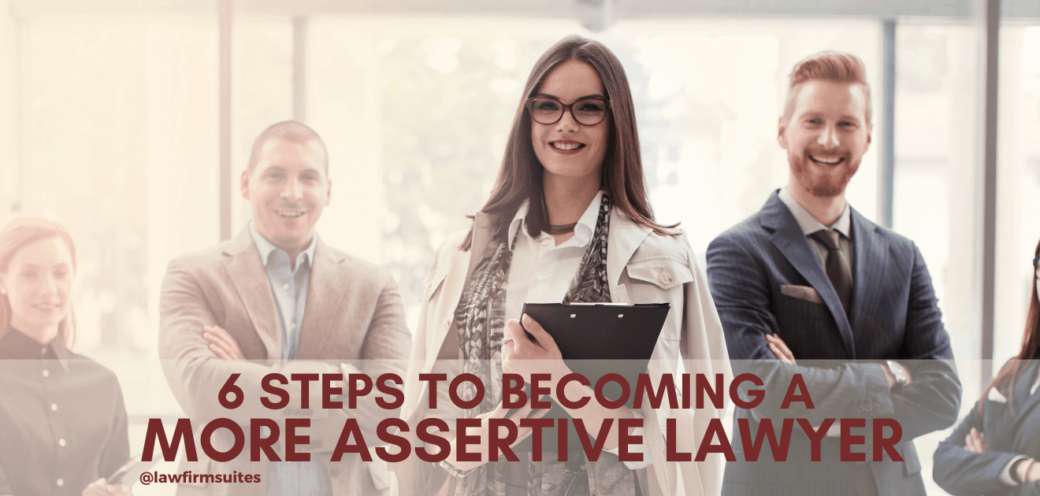Popular culture has taught us that the more aggressive a lawyer behaves, the better the lawyer is. Unfortunately, an aggressive lawyer can be a turn-off, the key is becoming an assertive lawyer.
The belief that hostile communication conveys confidence and success is essentially false. Through assertiveness, rather than aggressiveness, one can do more for their clients and keep professional relationships positive and proactive.
The line between aggressiveness and assertiveness isn’t always clear causing this to be one of the primary reasons many people associate hostility with success. You don’t need to dominate your opponents to win.
Assertiveness means being confident, respectful, and treating others as your equals. The goal is to enable constructive dialogue and allow others to have a voice.
To practice being assertive successfully, you will rely on three key principles:
- Be honest about what is relevant.
- Be clear about your bottom line.
- Always communicate with others as your equals.
How Can Assertiveness Be Beneficial for Lawyers?
- It can help with stress and anxiety.
Better communication skills can help lawyers find alternative ways of dealing with conflictual situations. This also helps when the lawyer is on the receiving end of aggressive behavior. Improved communication and new coping skills can help overcome feelings of intimidation or loss of control when confronted by people with inappropriate attitudes.
- Improves confidence
Assertiveness helps people respond better in problematic situations. Learning to set clear boundaries will help build confidence in the long run.
- Improves communication skills
This kind of conversation is a two-way process. Lawyers learn to become better listeners—vital for gathering important information. In doing so, their clients’ interests are better represented.
- Being a problem solver
Lawyers need to focus on the problem at hand rather than on other people’s personalities. In negotiations, the entire process will benefit from collaboration; improving the chances of encountering “win-win” situations more often than not.
So How Does a Lawyer Become More Assertive?
1. Evaluate Your Thoughts and Know Your Triggers
What are the situations that make you feel stressed? What are your thoughts in those moments?
If you are aware of your blind spots, you can learn how to avoid them. As a lawyer, you need to be mentally prepared and in control at all times. Actively think about how you’re going to behave.
When you are aware of what puts you at a disadvantage, you will gradually learn to rephrase the way you talk to yourself. Your internal dialogue will become more positive and empowering.
2. Study assertive approaches to communication
A lawyer has a responsibility to negotiate on behalf of the client. Always remember your bottom line. Keep your priorities and goals clear in your mind.
Even though it might seem difficult, you will need to learn to say “no”—respectfully, of course. This is a very important part of efficient communication and being true to your goals.
3. Practice Self Development
Improvement doesn’t happen instantly. And it’s not only about technical skills. It’s also about the way a person thinks, their personality, and their state of mind. And the best way to see a positive change in these areas is by working on improving yourself.
Self-development comes in many forms. You can learn more about public speaking. Or improve your powers of persuasion. To be successful, always strive to become a better person than you were yesterday.
4. Study assertive communication techniques
There are other communication techniques that you can try to improve. There’s your body language, your tone of voice, your choice of words, and many other details that make all the difference.
For instance, always maintain eye contact with the person you are talking to—this can help you stay focused and the other person will feel heard. Also, controlling the tone of your voice can help you remain calm, making it easier for you to de-escalate any tensions that might occur.
5. Do Everything Gradually
Change doesn’t happen overnight. You shouldn’t put too much pressure on yourself by expecting to be perfect by this time tomorrow. Switching the way you communicate might feel unnatural in the beginning. You risk sounding fake, and that’s the worst thing that can happen to a lawyer.
You should start with small steps. Try practicing these techniques in controlled environments, like during one-to-one meetings or informal catch-ups. This will help you reduce your anxiety and stress. The more you practice each technique, the more it will come naturally to you in each of your conversations.
6. Believe in Yourself
No matter what changes you want to see in yourself, they won’t happen if you don’t believe you can do it. Self-confidence is the secret to success, no matter the domain. If you don’t have a healthy and balanced sense of self-worth, you risk accepting less than you deserve from others.
It’s okay if you fail at some point. The important thing is to get back up and continue trying. This is where confidence comes into play—you need to keep in mind that you can do this. The trick is to never give up on yourself.
What to Keep in Mind
Change doesn’t happen overnight. Acting assertively draws on many cultivated skills, from self-reflection to goal-setting and the ability to prioritize, and even an awareness of body language. You need to practice continuously and accept that you will fail from time to time.
Another important thing is to believe in yourself. As a lawyer, you need to maintain high standards, be persistent, and pay attention to detail. Being able to communicate assertively will reduce your anxiety and stress and, in the long run, help you accomplish your objectives more efficiently, with composure and grace.


